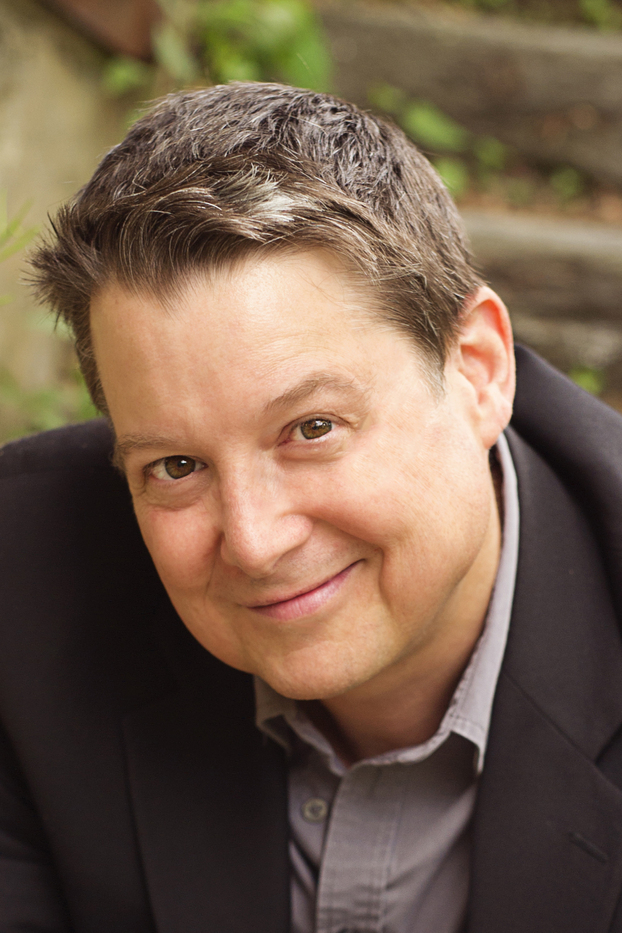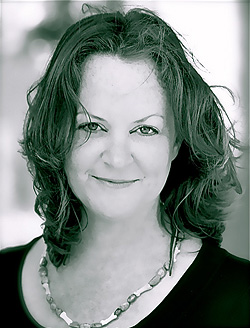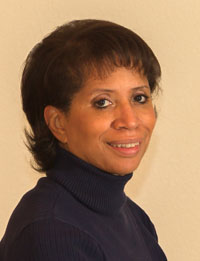 Crime fiction authors learn early on that their stories will need to fit neatly into a specific box – either traditional mystery or cozies. But don’t tell that to R.F James because she definitely didn’t get the memo. Her excellent six-book “Hollis Morgan” mystery series has roots solidly in both the traditional and the cozy worlds, and her fans love it. I sat down with her recently to talk about that series as well as the brand new one she has set to debut this summer.
Crime fiction authors learn early on that their stories will need to fit neatly into a specific box – either traditional mystery or cozies. But don’t tell that to R.F James because she definitely didn’t get the memo. Her excellent six-book “Hollis Morgan” mystery series has roots solidly in both the traditional and the cozy worlds, and her fans love it. I sat down with her recently to talk about that series as well as the brand new one she has set to debut this summer.
Open Mic: Tell me a bit about the “Hollis Morgan” series. Did you always intend for it to be a series or was it a standalone that developed that way?
James: I always intended the story of the “Fallen Angels Book Club” to be a series, but not for six books. I think I had three books in mind and then the characters started to evolve and develop an arc that went to six books. So, in my mind it would take at least three books for Hollis to come through about who she was, and as it turned out, it took six.
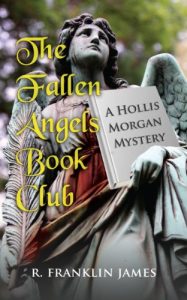 Open Mic: Is that how you queried it?
Open Mic: Is that how you queried it?
James: Yes, it was. When I pitched it to my agent I said I had three suggested titles and three proposed storylines. I didn’t think about a fourth book until the publisher said they wanted an option for book four, after books one and two sold well. I never thought about a book four until they mentioned it, to tell you the truth.
Open Mic: Do you have either another a series or your next solo adventure lined up yet?
James: Yes, book one of my new series: “Remy Loh Bishop Mysteries” comes out this summer. My protagonist, Remy Loh Bishop, isn’t anything like the Hollis Morgan character. She is more confident and in some ways more naive. She was a forensic tech who was framed for tampering with murder evidence.
Open Mic: Some reviewers refer to your books as legal cozies. I don’t think I agree with that, but how do you categorize the series?
James: I’d say they are strictly traditional. I remember one of my fans wrote me and asked why Hollis never carries a gun. But I think what separates me from being strictly hard crime is I that don’t have Hollis carrying a weapon. I have her pretty much using her wits, and sometimes her brute strength, to get out of circumstances versus having a gun. Remy, on the other hand will be carrying a gun.
Open Mic: Your protagonists are very strong, resourceful and intelligent women. Women make up the bulk of your readers. Could you see yourself ever creating a new series with a male protagonist?
James: I’m not going to say no because a story just comes to me and people sort of stand up. The plot just hits me. If it happens to be a male, I would not say no. I will say I was at book signing and this man came up to me because he noticed the structure of my name. I write under R. Franklin James, and he said “I didn’t realize the author was a woman. I don’t read mysteries by women.” I thought that was interesting. Was that a compliment? Anyway, it was something that sort of took me aback. I think I would feel comfortable getting into a male voice. Now getting into a male’s voice for the length of a whole book as the protagonist? I’m not sure, but you’ve given me an idea and I may try it.
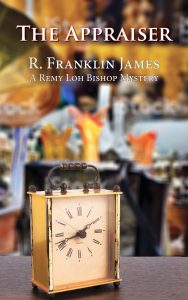 Open Mic: There has been a persistent debate in recent years about writing across culture and gender, i.e. whether men can accurately write female characters or white authors writing people of color. What’s your perspective on this?
Open Mic: There has been a persistent debate in recent years about writing across culture and gender, i.e. whether men can accurately write female characters or white authors writing people of color. What’s your perspective on this?
James: I think the value of any good writer, regardless of race, color, gender, preference, or whatever, is that you must tell a story that is credible and can stand on its own. Who the players are in that story, that’s called your craft. I don’t think you have to be black to write about black people. I don’t think I have to be white to write about white people, or gay to write about gay people. But for me, I do have to have that credibility, that truth, that voice that says I know what I’m talking about and that’s a must.
Open Mic: The publishing industry hasn’t always been overly welcoming to writers of color, and particularly women. How would you assess the environment now for African American authors, and particularly for women?
James: I find it’s really, really difficult. I am fortunate in that I got my agent through a referral, so networking worked for me. She didn’t know what race I was. And then my book sold to a publisher fairly quickly, within six months. But to get to that point was like ten or fifteen years. It was rejection after rejection. Women mystery writers meet an even greater challenge. The publishing industry wants names that sell books, male or female. I think regarding mysteries, the publishing edge is given to males.
I won’t tell you which one, but at a recent mystery writers’ conference there was a panel on diversity, and there was not one single person of color on that panel. What made it “diverse” is they picked people that wrote about people who had people of color in their books. And I think to a large extent – this is a long away around your question – people of color want to be measured against other writers for their writing, not because they are people of color. To have one panel on diversity is insulting–instead have many panels with diverse members. Diverse writers may not be well-known and therefore that whole writer network may not be available. It’s not necessarily a clique, but it definitely helps to know people, and we just don’t have the access. Walter Mosley is fantastic and the most generous person I have ever known. I’m not going to say it’s a breeze for him, but I imagine it’s much easier for a best-selling, record-breaking author like him, regardless of color, than it would be for me or any mid-list writer to get access to publishing dollars and support. He makes economic sense. It’s an uphill battle for emerging or sometimes established write to get recognition and to get placed on conference panels and asked to be interviewed by people like you. Add race and gender to the mix and it’s just gets twelve times more difficult. Is it economics or is it bias?
Open Mic: The same could be asked women about writing in the mystery genre. How is the environment these days for women writing crime fiction? I had a long talk with J.A. Jance recently, who told me that her publisher for her first book insisted that she use her initials because he said people wouldn’t read a mystery written by a women writing a male character.
James: There you go, that’s exactly what mine said. It will be easier for you to sell if you have your initials; R. Franklin James. That said, and again maybe I’m biased, but I like to think it’s getting easier in the industry. I think it’s not quite so strange to see a woman crime writer anymore. There are so many great ones out there.
Open Mic: I ask this question of all the fiction authors I speak to: which do you generally start with – plot or characters?
James: The story comes first. I ask myself the “what if” question first, and then the characters come from out of the story.
Open Mic: Do you use outside editors to go through a manuscript before you send it out to your agent? Or do you rely more on a writing group or another kind of beta reader?
James: Before I had my agent, I did use outside editors. After I got my agent, she edited my books and got everything ready to go to my publisher. After that I used my publisher’s editor, but I also leaned heavily on my critique group. Month in, and month out give me feedback on my manuscript and they have been a great resource.
Open Mic: Many aspiring writers that seek out writing advice only want to know how to write better or to get an agent and rarely seem as interested in how it all works as a business. What bit of advice would you give an aspiring author now about the business of writing?
James: Well, it’s the advice I give myself every day. I put the “I” in introvert. The most difficult part of writing for me is not the writing. That comes fairly easy. I’ve never had writer’s block. It’s the marketing. And yes, my agent tells me to: “suck it up, it’s part of the package and you’ve got to do it.” For a person that is starting out I would say, unless you are writing for an audience of one, yourself. You must get your book into the hands of your readers and fans. You have to make arrangements to speak and you have to get out there. Unless you’re really high profile, you’re going to have to do promotion on your own and even then you find yourself on the road. You have to just accept that marketing is part of the package. If you want to be successful, this is what you have to do. For me, I make just a little effort each day through social media, and try to schedule as many joint events as I can.
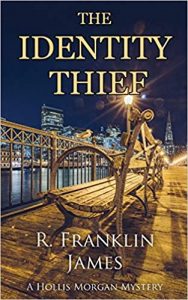 Open Mic: All creative endeavors involve a level of failure. How do you deal with failure or rejection?
Open Mic: All creative endeavors involve a level of failure. How do you deal with failure or rejection?
James: I don’t read my reviews. If I get a really good one my editor will send it to me, but I would never go to Amazon to see what people are saying. I would freak out. Then at book signings I’m assuming the people are there because they like me so I get through that okay. But with failure, and this was how I was raised, I just say okay, I got it and now let’s move on. Not that I failed – I just didn’t make it this time. Because I firmly believe that if I’m going to do something, I’m going to get it right and it’s going to be good. So failure to me is just “I just didn’t make it this time.”
Open Mic: What is the biggest mistake you’ve made in your writing career? Or maybe just the one thing you would do over if you could?
James: I would probably take myself more seriously, sooner. I’ve been writing since I was eight years old, and I mean literally binder paper in an attic writing stories about pirates and cowboys and other things I knew absolutely nothing about, page after page after page. And then I stopped, went to college, got married, made good on the whole education and family thing. I never stopped reading, but I stopped writing and I realized later that what I thought it would take to be a writer I could have done a lot sooner. I missed years of maybe being a debut author in my 20’s versus my 40’s. That would be my biggest regret.
Open Mic: Are you able to write full-time or do you also hold down a day job? How do you create the time to write?
James: I’m writing full time now. I just retired public service two years ago, and now I’m writing full time.
Open Mic: Do you have a daily page or word count you adhere to?
James: I can’t help myself. My employment background is as an analyst. First, I create an Excel spreadsheet. Then I say this book is going to be about 67,000 words. . I write to deadlines now, so if my publisher says the book is due January 1st, I put December 30 as my deadline date to transmit it to the publisher. Two weeks before is the completion of the final draft, etc. So then I back up to the date I have to start. That usually comes to be six or seven months out, so I take the number of days in a month and I divide that into 67,000. I take off weekends and sometimes holidays because I know I’m not going to work on Christmas, and then I back into the number of words I have to accomplish every day in order to make that deadline. And then I make this long running chart that I can plug in my number of words so each day I can see how many more words I have to do and if I have met my word goal for that day. Otherwise it rolls over to the next day. I have a lot of success writing to publishing deadlines.
Open Mic: What is harder for you – pacing or plot?
James: Actually it’s neither. When I start a story I pretty much know the plot. I always throw my own twists and turns because I don’t like to read a book that’s predicable, but I pretty much know the storyline. My thing is description. I’m cognizant of describing the character because I get in their head and I need to bring out that to the reader. So my thing is mostly setting description. I often have to go back and fill it in. I’m comfortable with pacing and plot. I’ll outline sometimes too just to keep track of everything. I’ll write midway of my book, about 37,000 words, and then I’ll write the ending. Then I know who did it and I know how they did it. Then I write from the middle to the ending so that all my clues, red herrings and scene development make sense. That’s just me.
Open Mic: I like to end with what I hope is a fun question. Let’s say I could put you together for dinner and a conversation with just one of the following three people. Which one would you choose and why? Your options are: the great Billie Holliday, famed lawyer Clarence Darrow or the infamous Bernie Madoff.
James: I think I’m going to go for Darrow. I don’t agree at all with his thinking on eugenics but I am somewhat of a legal hack and I do love the law, and I would want to know how he climbed up that really tall hill of criminal defense. I would just want to know his thinking. The law runs on consistency, not necessarily on justice or truth and so I just would like to know how he built his arguments to the jury. How did he “sell” his client?

